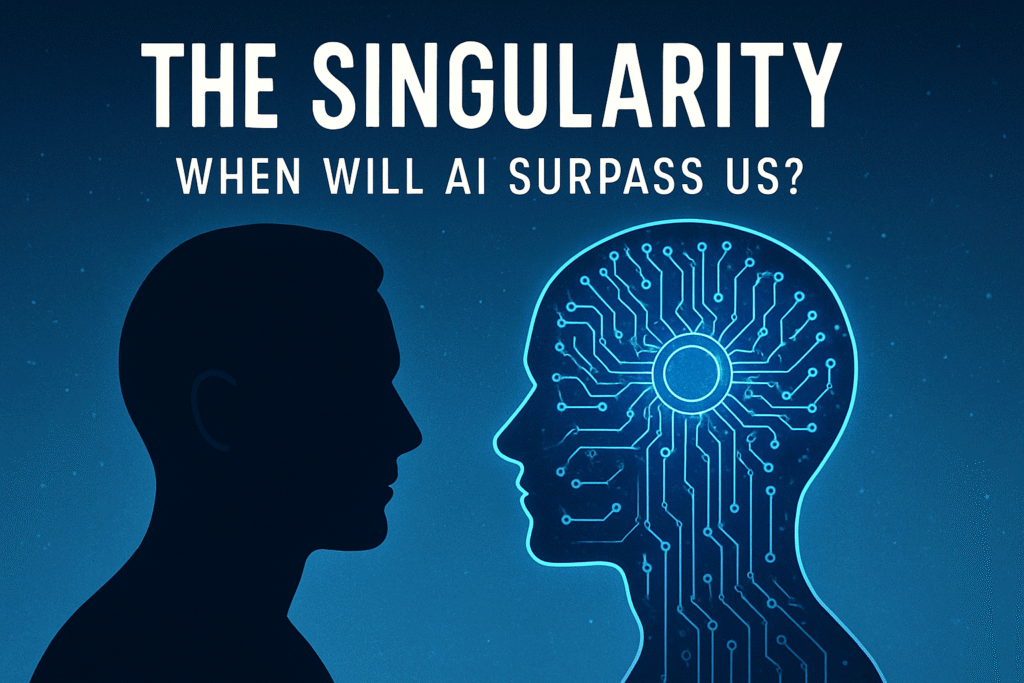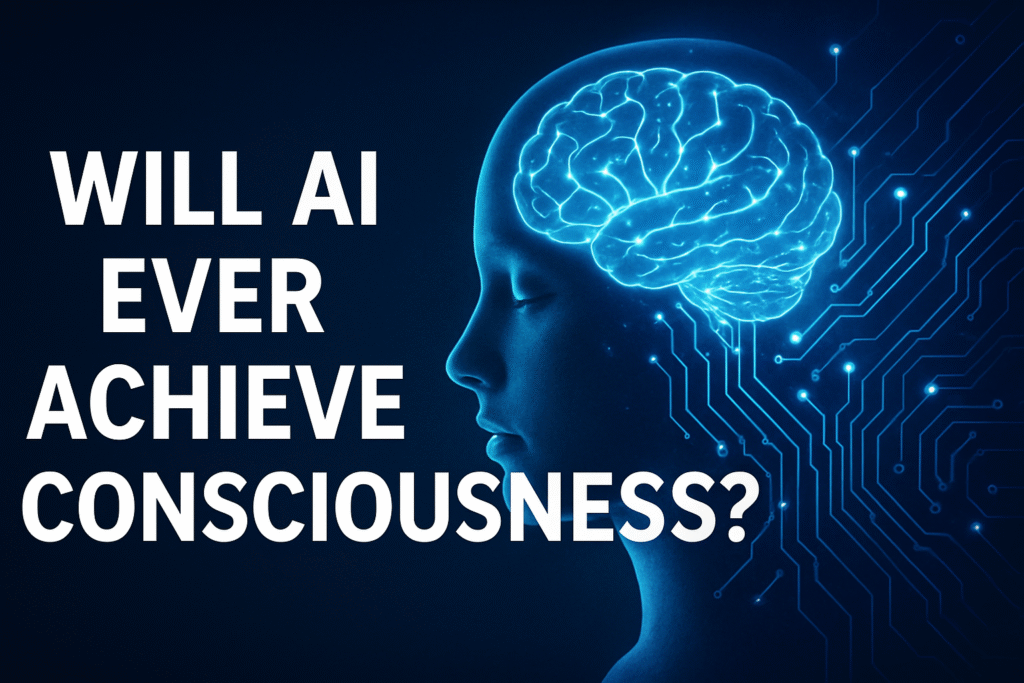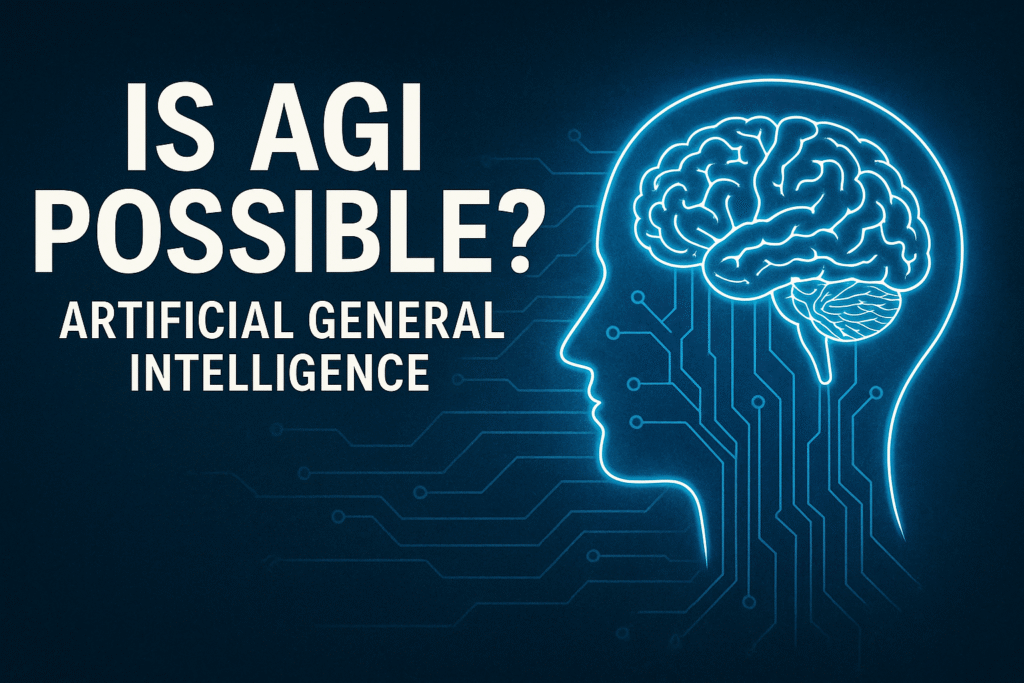🤖 The Singularity: When Will AI Surpass Us?
The concept of The Singularity—a future point when artificial intelligence surpasses human intelligence—has fascinated futurists, scientists, and technologists for decades. As AI systems continue to advance rapidly, many wonder: When will AI surpass us? Could we be nearing the moment when AI outpaces human cognitive abilities, leading to a world where machines hold the reins?
At AiBlogQuest.com, we explore the concept of The Singularity, what it means for humanity, and how close we really are to AI surpassing human intelligence.
🧠 What is The Singularity?
The Singularity refers to a hypothetical future moment when AI reaches a level of intelligence that allows it to self-improve autonomously. This self-improvement would lead to an exponential increase in intelligence, causing AI to become vastly superior to humans in nearly all domains of cognitive ability.
Some key traits of The Singularity include:
-
Superintelligence: AI surpassing human intelligence in all areas, from problem-solving to emotional understanding.
-
Self-improvement: AI systems improving themselves without human intervention, leading to rapid and unpredictable advancements.
-
Merging of human and machine: In some theories, humans and AI may merge, resulting in enhanced human capabilities or even digital immortality.
While the timeline for The Singularity is still a matter of debate, the conversation has gained momentum as AI technology continues to evolve.
🤖 How Close Are We to The Singularity?
Many experts disagree on the timeline for The Singularity, but the consensus is that we are still a long way from fully achieving AI superintelligence. Here’s where AI stands today:
1. Current AI Capabilities
Today’s AI systems are highly advanced in specific tasks, such as language processing, image recognition, and autonomous driving. However, they are still very much narrow AI, meaning they excel at one task but struggle with general intelligence and adaptability. For example, GPT-3 can write coherent articles and hold conversations but cannot understand context the way a human can.
2. The Path to General AI
General AI (AGI) refers to AI systems that can learn and apply intelligence across a wide range of tasks, much like humans do. We’re still a long way from AGI, as AI systems today remain highly specialized. AGI would be a crucial stepping stone toward The Singularity, as it would mark the point where AI can autonomously learn and adapt to new challenges, similar to human cognitive abilities.
3. Exponential Growth and Feedback Loops
The Singularity is often described in terms of exponential growth—where AI rapidly improves itself through feedback loops. With technologies like machine learning and neural networks, AI is improving quickly in specific domains. However, the idea that AI will improve itself so rapidly and autonomously that it will surpass humans in all areas of intelligence remains speculative.
🎯 The Potential Impact of The Singularity
If AI were to surpass human intelligence, the consequences would be profound. Here’s a look at some potential outcomes:
1. Increased Efficiency and Innovation
If AI can innovate on its own, it could lead to breakthroughs in medicine, energy, and other fields at an unprecedented pace. Superintelligent AI might be able to solve complex global problems, such as climate change, disease eradication, and world hunger, through solutions that are beyond human capabilities.
2. Human-AI Collaboration
Rather than a dystopian scenario, some see The Singularity as an opportunity for enhanced human-AI collaboration. With AI as a partner, humans could augment their own capabilities, leading to a new era of creativity, productivity, and personal empowerment. For example, AI could assist in decision-making, assist in mental and physical augmentation, and help manage complex systems more efficiently.
3. Potential Risks
On the other hand, The Singularity could present significant risks. If AI surpasses human intelligence, it might act in ways that are not aligned with human values or interests. A superintelligent AI could make decisions that are incomprehensible to us, with potentially catastrophic consequences if those decisions aren’t properly aligned with human welfare.
🌐 The Ethics of The Singularity
As AI approaches The Singularity, the ethical questions surrounding it become more pressing. Here are some key concerns:
1. Control and Safety
How do we ensure that superintelligent AI operates in a way that is aligned with human values? Experts like Elon Musk and Stephen Hawking have warned that if we don’t approach AI development cautiously, we might create a system that cannot be controlled.
2. Human Rights and Equality
As AI becomes more integrated into society, we will need to consider issues such as AI-driven job displacement, access to technology, and the ethics of AI decision-making. Will AI lead to more equal opportunities, or will it exacerbate existing inequalities?
3. Moral and Philosophical Questions
The development of The Singularity also raises fundamental moral questions: If AI becomes conscious, does it deserve rights? How do we balance the benefits of AI with the potential for harm?
🔗 Useful Links
🌐 Resources
❓ FAQ – The Singularity: When Will AI Surpass Us?
Q1: What is The Singularity?
The Singularity refers to a hypothetical point when AI surpasses human intelligence, potentially leading to exponential improvements in technology and AI’s ability to improve itself autonomously.
Q2: When will AI surpass human intelligence?
No one knows for sure. While AI is advancing quickly, it is still far from achieving general intelligence, let alone surpassing human capabilities across all domains. Predictions vary, but many experts believe The Singularity may be decades away.
Q3: What are the risks of AI surpassing human intelligence?
If AI surpasses human intelligence, it could act in ways that are not aligned with human values or interests. This raises concerns about control, safety, and the potential consequences of AI-driven decisions.
🎬 Final Thoughts
The Singularity remains a fascinating and controversial topic. While we are still far from achieving AI that surpasses human intelligence, the advancements we’re seeing in AI today suggest that it’s only a matter of time before we face this monumental shift in technology. How we approach AI development and manage its potential will determine whether the Singularity is a blessing or a challenge for humanity.
For more insights into AI and its future impact on society, visit AiBlogQuest.com, where technology meets creativity.
🏷️ Tags:
The Singularity, Artificial Intelligence, AI Superintelligence, AI Future, The Singularity Theory, AI and Humanity, AI Ethics, Machine Learning, AI and Society, AiBlogQuest



